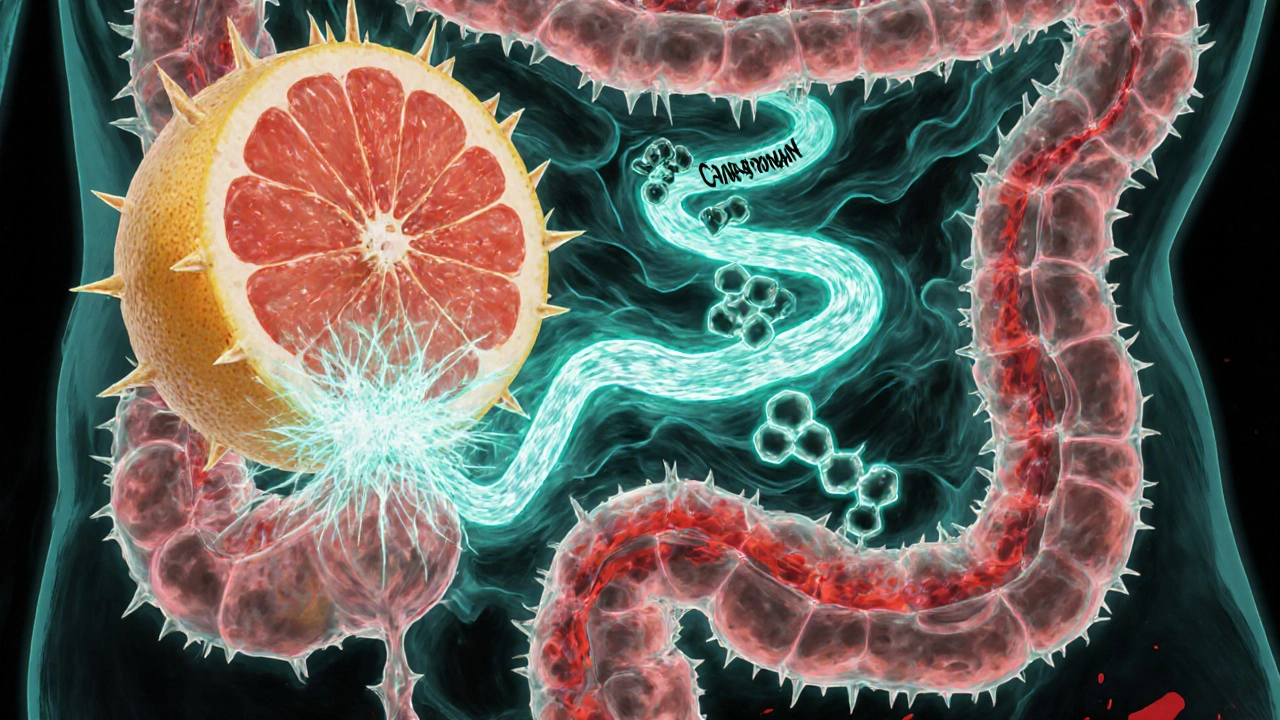Statins & Grapefruit Interaction Checker
Check Your Statin Safety
Select your statin medication to see if grapefruit poses a danger to you.
Every morning, millions of Americans take a statin to lower their cholesterol and protect their heart. But if you’re one of them-and you love grapefruit for breakfast-you could be putting yourself at risk without even knowing it. This isn’t a myth. It’s a well-documented, potentially life-threatening interaction that’s been studied for decades. The problem isn’t that grapefruit is bad for you. It’s that when it meets certain statins, your body can’t process the medication the way it should. And that can lead to dangerous side effects.
Why Grapefruit Changes How Statins Work
Grapefruit doesn’t just taste tart-it contains chemicals called furanocoumarins that interfere with a key enzyme in your gut called CYP3A4. This enzyme normally breaks down certain drugs before they enter your bloodstream, keeping their levels safe and controlled. When furanocoumarins block this enzyme, your body absorbs way more of the statin than intended. Think of it like turning up the volume on your medication without changing the dose. This isn’t a small effect. A landmark 1998 study showed that just one glass of grapefruit juice increased the blood levels of simvastatin by up to 16 times. That’s not a typo. Sixteen times. Even a small amount-like 200 mL (about 7 ounces) of juice-can cause this. And the effect lasts. Your gut enzyme doesn’t bounce back after a few hours. It takes about three full days to recover. So if you drink grapefruit juice on Monday, your body is still processing statins at dangerous levels on Wednesday.Which Statins Are at Risk?
Not all statins react the same way. The interaction depends entirely on how your body breaks them down. Statins that rely heavily on CYP3A4 are the ones you need to worry about:- Simvastatin (Zocor) - Highest risk. Even small amounts of grapefruit can push levels into toxic territory.
- Lovastatin (Mevacor) - Also high risk. Similar to simvastatin in how it’s processed.
- Atorvastatin (Lipitor) - Moderate risk. The FDA warns against mixing this with grapefruit, especially in higher doses.
- Pravastatin (Pravachol)
- Rosuvastatin (Crestor)
- Fluvastatin (Lescol)
- Pitavastatin (Livalo)
The Real Danger: Muscle Damage and Kidney Failure
The most common side effect of too much statin is muscle pain-what doctors call myalgia. About 5-10% of people on high-risk combinations report it. But that’s just the warning sign. The real threat is rhabdomyolysis, a rare but devastating condition where muscle tissue breaks down and floods your bloodstream with a protein called myoglobin. Your kidneys try to filter it out. But when too much myoglobin piles up, they can’t keep up. That leads to kidney damage-or even failure. In one documented case, a 40-year-old woman developed rhabdomyolysis after eating grapefruit daily for 10 days while taking simvastatin. She didn’t have a history of muscle problems. No other risk factors. Just grapefruit and her statin. Symptoms to watch for:- Unexplained muscle pain, tenderness, or weakness
- Dark, tea-colored urine
- Fatigue or feeling generally unwell

How Much Is Too Much?
There’s no magic number where grapefruit suddenly becomes dangerous. Even one glass a day can cause problems. The 1998 study used 200 mL of double-strength juice three times a day-but real-life consumption is often less controlled. A whole grapefruit, a bottle of juice, or even a single serving of grapefruit-flavored yogurt or marmalade can contain enough furanocoumarins to block CYP3A4. And here’s the catch: timing doesn’t help. You can’t space out your statin and your grapefruit. Because the enzyme damage is irreversible, the effect builds up over time. Taking your pill in the morning and drinking juice at night? Still risky. Waiting 12 hours? Still risky. The enzyme stays blocked for days.What About Other Citrus Fruits?
Not all citrus is the enemy. Regular oranges, lemons, limes, and tangerines are safe. The problem is specific to grapefruit and two close relatives:- Seville oranges - Used in traditional marmalade. They contain the same furanocoumarins.
- Pomelos - A large, thick-skinned citrus fruit. Often mistaken for grapefruit but even higher in furanocoumarins.

What Should You Do?
If you’re on a statin and you eat grapefruit:- Check your medication label. Simvastatin, lovastatin, and atorvastatin all carry FDA warnings about grapefruit. If it’s listed, avoid it completely.
- Ask your doctor or pharmacist. Don’t assume your provider knows you’re eating grapefruit. Only 42% of doctors routinely ask about it.
- Don’t stop your statin. Stopping your medication increases your risk of heart attack and stroke more than grapefruit ever could. Switching statins is the answer-not quitting.
- Consider switching to a safer statin. Pravastatin or rosuvastatin are excellent alternatives with no grapefruit interaction.
The Future: Grapefruit Without the Risk?
Scientists at the University of Florida are working on something that could change everything: grapefruit bred to have almost no furanocoumarins. Early results show they can keep the sweet taste, the vitamin C, and the antioxidants-while removing the dangerous compounds. If this works, we might one day be able to enjoy grapefruit with our statins without worry. But that’s still years away. Until then, the safest choice is clear: know your statin. Know your grapefruit. And don’t risk your health for a morning fruit.Can I have grapefruit if I take a low dose of simvastatin?
No. Even low doses of simvastatin can become dangerously high when mixed with grapefruit. The interaction isn’t about the dose of the statin-it’s about how grapefruit blocks your body’s ability to clear it. A 10 mg dose of simvastatin with grapefruit can act like 160 mg. That’s enough to cause muscle damage. Avoid it completely.
Is grapefruit juice worse than the fruit itself?
It’s not about juice versus fruit-it’s about how much furanocoumarin you consume. A whole grapefruit has roughly the same amount as a glass of juice. Some juices are concentrated or "double-strength," which means even more of the harmful compounds. Stick to the rule: if it’s grapefruit, avoid it. No exceptions.
What if I only eat grapefruit once a week?
Still risky. The enzyme inhibition lasts about 72 hours. So if you eat grapefruit on Monday, your body is still processing your statin dangerously on Thursday. Even occasional consumption can keep your statin levels too high. For high-risk statins like simvastatin and lovastatin, it’s not a matter of frequency-it’s a matter of total avoidance.
Can I switch to a different statin if I love grapefruit?
Yes, and it’s often the best solution. Pravastatin, rosuvastatin, fluvastatin, and pitavastatin don’t interact with grapefruit. Many people switch successfully and keep enjoying their favorite fruit. Talk to your doctor about whether one of these alternatives is right for your cholesterol levels and heart health.
Are there any warning signs I should look for before it’s too late?
Yes. The most common early sign is unexplained muscle pain or weakness-not the soreness from a workout, but a deep, persistent ache. Dark or tea-colored urine is a red flag. If you notice either, stop grapefruit immediately and contact your doctor. Rhabdomyolysis can progress quickly, but catching it early can prevent kidney damage.

Emily Kidd
i just found out my dad takes simvastatin and eats grapefruit every morning like its nothing. i almost choked on my coffee. dude’s been doing this for 5 years. i’m calling his doctor right now.
Justin Cheah
they’re hiding the truth again. why do you think the FDA only warns about some statins? Big Pharma doesn’t want you switching to safer ones because they make more money off the dangerous ones. Grapefruit is a natural detoxifier, they’re scared people will realize they don’t need their $300/month pills at all. And don’t get me started on how they banned kava and turmeric but let this poison stay on shelves. They want you sick. Always have. Always will.
caiden gilbert
the grapefruit thing always felt like one of those weird urban legends until i saw my cousin’s lab results after she went on simvastatin and started drinking juice daily. her CK levels were through the roof. she thought it was just ‘working out too hard.’ turns out her muscles were basically dissolving. now she drinks orange juice and swears by it. weird how something so innocent can sneak up on you like that.
phenter mine
sooo i just checked my med and its atorvastatin… and i eat grapefruit like twice a week. is that bad? i mean i dont drink juice just eat the fruit. i think i might have read somthing about it being ok if you dont eat it at the same time? idk i’m so confused now
Aditya Singh
the entire premise is pseudoscientific reductionism. CYP3A4 is a metabolic pathway, not a binary on/off switch. The pharmacokinetic data cited is from in vitro studies with pharmacological-grade furanocoumarins, not dietary exposure. You’re conflating statistical outliers with clinical significance. The incidence of rhabdomyolysis from grapefruit-statin interaction is less than 0.001% in real-world cohorts. This is fearmongering disguised as public health messaging. Also, why aren’t we talking about the pro-inflammatory effects of statins themselves? That’s the real elephant in the room.
Katherine Reinarz
OMG I JUST ATE A GRAPEFRUIT THIS MORNING AND IM ON LIPIATOR AND I FEEL WEIRD LIKE MY ARMS ARE WEAK AND I JUST STARTED CRYING WHY IS THIS HAPPENING IM GOING TO DIE IM SORRY MY KIDS IM SORRY
John Kane
hey everyone - i just want to say this is such an important topic and i’m glad we’re talking about it. i’ve been on rosuvastatin for 6 years now and i still eat grapefruit like it’s my job. no issues. but i also made sure to talk to my pharmacist and get tested before switching. it’s not about fear - it’s about awareness. if you’re on simvastatin or lovastatin and love grapefruit? don’t panic. just ask your doc about switching. it’s a simple fix. and if you’re not sure? call your pharmacy. they’ll tell you in 2 minutes. we’ve got this. your heart deserves a little care - and so does your breakfast.
Callum Breden
It is astonishing how poorly informed the general public remains regarding pharmacokinetic interactions. The 1998 study referenced is not merely ‘landmark’ - it is definitive. To suggest that ‘moderate risk’ is acceptable for atorvastatin is grossly irresponsible. The FDA’s warning is deliberately understated to avoid litigation. The notion that ‘switching statins’ is a panacea ignores individual genetic variability in CYP2C9 and SLCO1B1 polymorphisms. This is not a dietary advisory - it is a clinical imperative. If you are consuming grapefruit, you are compromising your cardiovascular integrity. Period.
Mansi Gupta
Thank you for sharing this detailed and thoughtful breakdown. I’ve been on pravastatin since 2020 and always wondered why my doctor didn’t mention grapefruit. Now I understand it’s because it’s safe. I’ve shared this with my mother, who takes simvastatin - she’s switching next week. Small changes can make a big difference. I appreciate the clarity and care in your writing.
Jackson Olsen
so if i take my pill at night and eat grapefruit in the morning… still bad? 😅